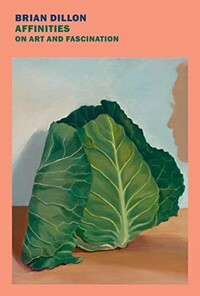Ryan Ruby at Bookforum:
 “I found myself frequently using the word affinity,” he writes, “and wondered what I meant by it.” Taken together, the book’s ten “essays on affinity” can be described as a kind of manifesto for an anti-critical criticism. Dillon subjects the word to a familiar array of para-academic procedures. He considers its etymology; its relationship to cognate concepts like fascination, appreciation, sympathy, attraction, the crush; its lowly position in the hierarchy of accepted aesthetic categories; the history of its usage in the discourses of literature, science, and theory; its metaphorical relations to images of, for example, fog and light; its unassimilability to the norms and procedures of scholarship; its noncognitive status as an affective atmosphere or mood. Much like Dillon himself, who supplements his freelance work by teaching creative writing at Queen Mary University of London, “affinity” is perched on a wire between the technical jargon of the English department, where interpretations are advanced and arguments in support of them are defended, and the demotic vocabulary of the social cataloguing site, where an algorithm sorts objects according to their similarities, and users are content to simply “like” them. “When I wrote affinity in a piece of critical prose,” Dillon muses, “perhaps I was trying to point elsewhere, to a realm of the unthought, [the] unthinkable, something unkillable by attitudes or arguments.”
“I found myself frequently using the word affinity,” he writes, “and wondered what I meant by it.” Taken together, the book’s ten “essays on affinity” can be described as a kind of manifesto for an anti-critical criticism. Dillon subjects the word to a familiar array of para-academic procedures. He considers its etymology; its relationship to cognate concepts like fascination, appreciation, sympathy, attraction, the crush; its lowly position in the hierarchy of accepted aesthetic categories; the history of its usage in the discourses of literature, science, and theory; its metaphorical relations to images of, for example, fog and light; its unassimilability to the norms and procedures of scholarship; its noncognitive status as an affective atmosphere or mood. Much like Dillon himself, who supplements his freelance work by teaching creative writing at Queen Mary University of London, “affinity” is perched on a wire between the technical jargon of the English department, where interpretations are advanced and arguments in support of them are defended, and the demotic vocabulary of the social cataloguing site, where an algorithm sorts objects according to their similarities, and users are content to simply “like” them. “When I wrote affinity in a piece of critical prose,” Dillon muses, “perhaps I was trying to point elsewhere, to a realm of the unthought, [the] unthinkable, something unkillable by attitudes or arguments.”
more here.
